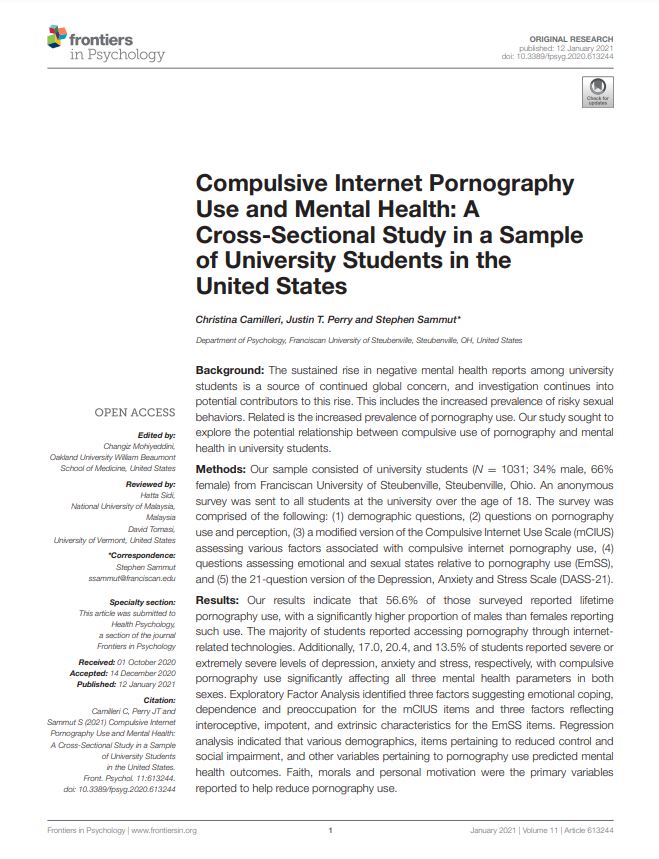Mental Health
Compulsive Internet Pornography Use and Mental Health
 Full Article Title: Compulsive Internet Pornography Use and Mental Health: A Cross-Sectional Study in a Sample of University Students in the United States.
Full Article Title: Compulsive Internet Pornography Use and Mental Health: A Cross-Sectional Study in a Sample of University Students in the United States.
Open Access: Yes
Abstract
Background: The sustained rise in negative mental health reports among university students is a source of continued global concern, and investigation continues into potential contributors to this rise. This includes the increased prevalence of risky sexual behaviors. Related is the increased prevalence of pornography use. Our study sought to explore the potential relationship between compulsive use of pornography and mental health in university students.
Methods: Our sample consisted of university students (N = 1031; 34% male, 66% female) from Franciscan University of Steubenville, Steubenville, Ohio. An anonymous survey was sent to all students at the university over the age of 18. The survey was comprised of the following: (1) demographic questions, (2) questions on pornography use and perception, (3) a modified version of the Compulsive Internet Use Scale (mCIUS) assessing various factors associated with compulsive internet pornography use, (4) questions assessing emotional and sexual states relative to pornography use (EmSS), and (5) the 21-question version of the Depression, Anxiety and Stress Scale (DASS-21).
Results: Our results indicate that 56.6% of those surveyed reported lifetime pornography use, with a significantly higher proportion of males than females reporting such use. The majority of students reported accessing pornography through internet-related technologies. Additionally, 17.0, 20.4, and 13.5% of students reported severe or extremely severe levels of depression, anxiety and stress, respectively, with compulsive pornography use significantly affecting all three mental health parameters in both sexes. Exploratory Factor Analysis identified three factors suggesting emotional coping, dependence and preoccupation for the mCIUS items and three factors reflecting interoceptive, impotent, and extrinsic characteristics for the EmSS items. Regression analysis indicated that various demographics, items pertaining to reduced control and social impairment, and other variables pertaining to pornography use predicted mental health outcomes. Faith, morals and personal motivation were the primary variables reported to help reduce pornography use.
Conclusion: Our analyses indicate a significant relationship between mental health and pornography use, including behaviors reflecting behavioral addictions, highlighting the necessity for a better understanding and consideration of the potential contribution of internet pornography to negative mental health among university students.
Relevance
This study of university-aged American students “highlights the interrelationship between pornography use and negative mental health outcomes in university/college students, predicted by compulsive behaviors reflecting behavioral addiction.” In particular, pornography users had higher and “significantly higher” scores for depression, stress, and anxiety. The “analysis also appears to highlight certain traits that seem to bear significant similarities to aspects of behavioral addictions, which also impact mental well-being,” such as compulsive or pathological use of pornography, preoccupation (e.g., “rushing work in order to access pornography websites, thinking about the websites when not online and the anticipation of the next internet pornography session”), finding it difficult to stop or spend less time using pornography websites, social impairment and isolation (e.g., e.g., “preference toward accessing pornography over spending time with others, neglecting daily obligations due to preferring to access pornography”), and use of pornography for “emotional coping.”
Citation
Camilleri, C., Perry, J. T., & Sammut, S. (2021). Compulsive Internet Pornography Use and Mental Health: A Cross-Sectional Study in a Sample of University Students in the United States. Frontiers in Psychology, 11, January, Article 613244. https://doi.org/10.3389/fpsyg.2020.613244

